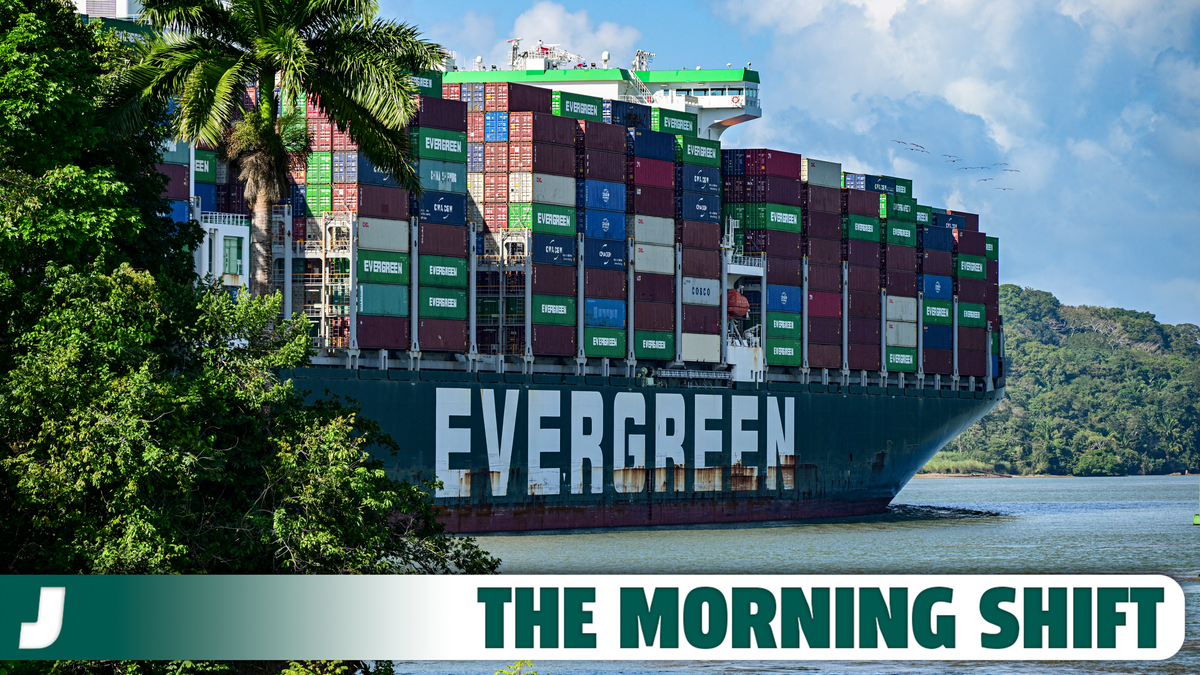Good morning! It’s Wednesday, January 17, 2024, and this is The Morning Shift, your daily roundup of the top automotive headlines from around the world, in one place. Here are the important stories you need to know.
1st Gear: A Major Drought Is Causing Traffic Jams In The Panama Canal
It’s not a giant container ship run aground, or a deadly pandemic this time, but plain old boring climate change causing chaos for global trade. At least 40 percent of all U.S. container traffic heads through the Panama Canal, the man-made passage that connects the Atlantic to the Pacific Ocean. Water levels are low in the canal due to an unprecedented drought during what should be the country’s rainy season. Currently only 20 passages are allowed through the canal per day, down from 24 in November. The Panama Canal Authority plans to reduce the number of passages further next month to just 18 a day.
This slow down is going to impact nearly everything, as Bloomberg discussed on its podcast The Big Take:
Peter Millard: Normally, they do 36 to 38 vessels a day through the canal. That’s, you know, kind of the normal standard. Right now — they’re at about 22 to 24. The Panama Canal uses three times as much water as New York City… in a single day. Ships need these high volumes of water to be able to float efficiently through the canal, and right now — there’s not enough water for all of them.
Peter Millard: The Panama Canal has been having troubles with water throughout 2023. And in October, the situation got a bit more critical.
Sarah Holder: As the line of ships grows in the canal, the consequences that this backlog could have for the global and local economy grow too. On today’s show — what’s happening to the Panama Canal and can it be fixed?
Combine the drought with a post-COVID increase in global shipping and the 2016 expansion of the canal and you’ve got a perfect recipe for delays, shortages and kinks in the global supply chain we haven’t seen in a year. The problem is so bad that the tops of trees that once blanketed the canal’s reservoir, Lake Gatun, are beginning to stick up out of the water during the period where that water should be replenished by rains. So far, companies have paid $235 million to leap frog the line, but only so many companies can do that every day. Others are sending shipments around the tip of South America, or even the long way around through the Suez Canal.
There are several solutions to the low water levels—none of them very good. One idea would flood an area where over 10,000 people make their homes. The problem is definitely worth keeping an eye on as the dry conditions will only get worse as we head into spring and Panama’s actual dry season.
2nd Gear: UAW Is Heading To Volkswagen’s Chattanooga Plant For Organizing Efforts
United Auto Workers President Shawn Fain told members Tuesday night that the UAW will go after Stellantis for laying off over 500 temporary workers, but those jobs weren’t the biggest news of the evening. The UAW is taking another stab at unionizing a non-American automaker here in the U.S. It makes sense, as these non-union workers are already recieving the benefits of organized labor, according to the Detroit Free Press:
“We’re in this fight not to win it for them,” Fain said of the UAW’s recent push to organize nonunion automakers in the South. “We’re in this fight because we rise and fall together in solidarity in the truest sense of the word. That’s what this is about. The fate of the U.S. autoworker in the South is the fate of the autoworker in Michigan.”
On the heels of its historic contract win with Detroit’s three automakers last fall, the union has started a drive to try to unionize some 13 U.S. plants run by Toyota, Honda, Hyundai, Nissan, Subaru, Mazda, Volkswagen, Mercedes, BMW and Volvo. Electric vehicle makers Tesla, Rivian and Lucid also are targets.
The UAW’s contracts with General Motors, Ford and Stellantis — which makes Chrysler, Dodge, Jeep, Ram and Fiat brands — include 25% pay raises by the end of the contract in April 2028. With cost-of-living increases, workers will see about 33% boosts in wages for a top assembly wage of $42 per hour, plus annual profit sharing.
Shortly after ratifying the contracts with the Detroit carmakers, Nissan, Honda, Hyundai, Toyota and Volkswagen all offered raises of 9% to 14% to their U.S. workforces. Experts dub those raises a “UAW bump.”
United Auto Workers Vice President Chuck Browning will be heading down to Chattanooga, Tennessee, this weekend after 2,000 of the 5,500 employees asked for the UAW to come and organize their shop. Browning headed negotiations with Ford during the recent successful contract negotiations.
3rd Gear: Tesla And Uber Form Unholy Alliance To Promote EV Adoption
Uber is sharing its mountains of transportation data to help Tesla build more convenient charging points, while also incentivizing EV adoption among drivers working for the app. Uber will offer drivers up to $2,000 in incentives to switch over to a Tesla Model 3 or Model Y. From Axios:
“We know from listening to Uber drivers that the cost of ownership and access to convenient charging are the top two barriers preventing them from going electric, and we are excited to work with Tesla to tackle both of these issues,” Andrew Macdonald, senior vice president of mobility and business operations at Uber, tells Axios via email. “Working with cities, there is much more we can do together to speed up the pace of electrification.”
Uber’s been pushing for its drivers to EVs since 2020. Obviously the absolute mess that was the COVID-19 pandemic slowed down adoption rates, but with Tesla (and other EV manufacturers) struggling to move cars, it’s a good time to buy. Right now, only 6.5 percent of Uber rides occur in an electric vehicle.
4th Gear: Stellantis Has A New Head In Charge Of North American Operations
Who doesn’t love a promotion! Stellantis bumped up long-time automotive big wig Carlos Zarlenga from leading Mexico operations up to the whole dang continent, according to the Detroit Free Press:
Carlos Zarlenga, president of Stellantis Mexico, who is also a former executive at General Motors and GE, has been picked to replace Mark Stewart as chief operating officer. Stewart has been COO of North America since 2018, which was before the merger that created Stellantis in 2021.
Stewart, who made headlines separately when he purchased Detroit’s famed Fisher Mansion for $4.9 million in 2022, led the North American region for the automaker during the last two contract talk periods with the UAW, the most recent of which wrapped up late last year following a historic strike of Ford Motor Co., General Motors and Stellantis. The contracts led to significant wage and benefit gains for represented workers.
Reverse: Patent Holder Of The Car Dies
From This Day In Automotive History
George Selden, the original US patent holder for the automobile, passed away on January 17, 1922. His right to earn royalties on every automobile produced in the United States was challenged by Henry Ford, who ultimately won the case, freeing automakers from the overarching grasp of his claim.







